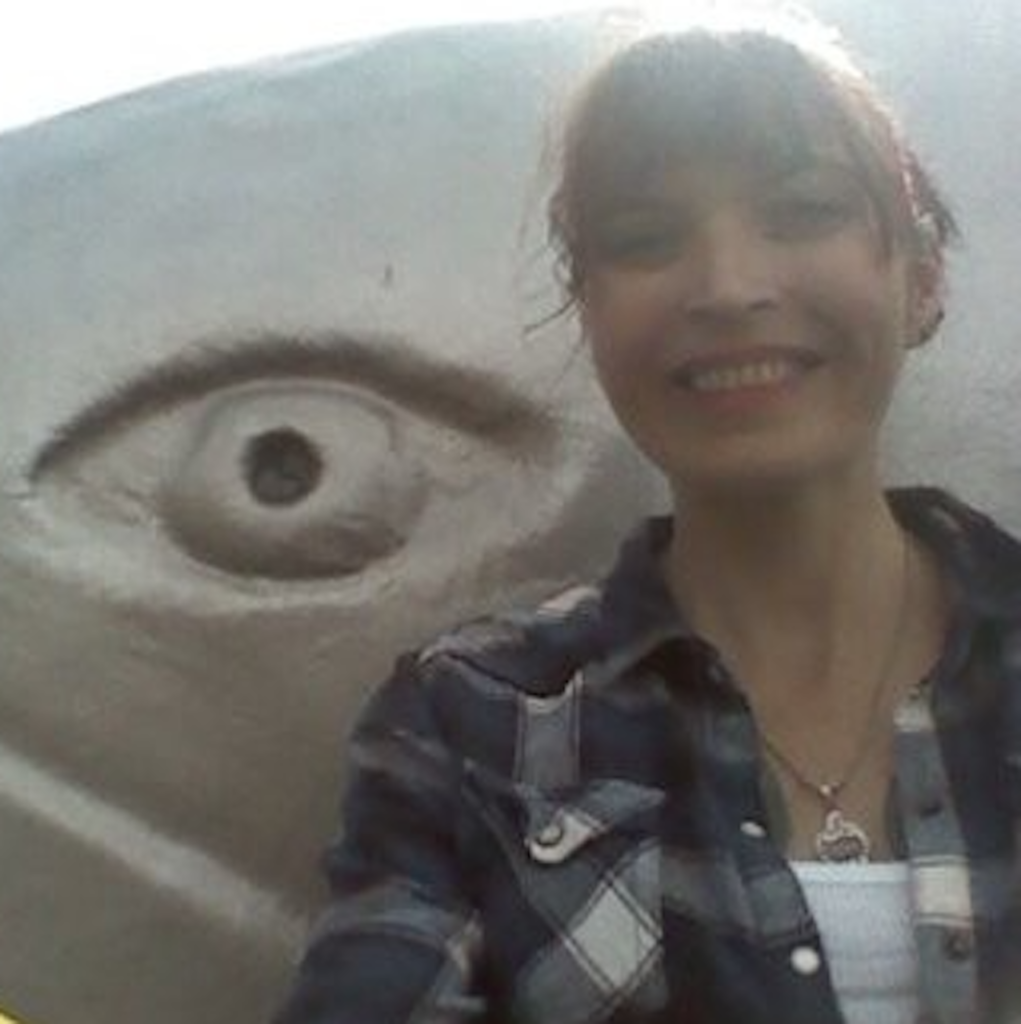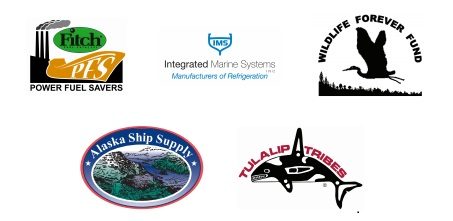Julia A. Sanders died on December 8, 2021 from complications following spleen-removal surgery at University of Washington Medical Center. She was 41.
Known for her exceptional kindness, loyalty, and intellect, Julia is remembered as a steadfast ally and friend, a loving daughter and sister, and a wise, deeply committed advocate for fishing communities facing increasing impacts of climate change.
Julia served as Deputy Director of the National Fisheries Conservation Center (NFCC) and its Global Ocean Health program. In that role she wore many hats: editor of the Ocean Acidification Report and other publications; manager of social media operations; organizer of fundraising events; administrative manager; researcher; public speaker; and advisor to the Working Group on Seafood and Energy, a trade organization representing seafood-dependent communities and businesses.
A gifted writer of epistolary emails, Julia cultivated friends and supporters on behalf of Global Ocean Health, earning a deeply loyal following of her own. “What a fun gal! Feisty courageous spunky daring forgiving smart caring- and so much more- we are going to miss her like crazy,” recalls Anne Kroeker of Seattle, who with her husband Richard Leeds became close friends with Julia. On learning of Julia’s death, Richard wrote: “Tears and tearing of my heart. My utmost sympathy goes out to you and her family at this devastating loss. Sadly losing Julia is the worst loss of these difficult times. Julia was a great person and greatly appreciated. Marine ecosystems and sustainability lost a great benefactor.”
Alyson Myers, a Virginia shellfish grower and nonprofit leader researching potential for sustainable harvest of sargassum overgrowth in the Atlantic, wrote: “Julia was a joy. She was gifted and intelligent, joyful in her work writing about ways to assist our biggest ecosystem, the ocean. She loved researching solutions and those who pursued them.”
“Julia was completely integral to the work of Global Ocean Health, and was loved by many of the people we work with,” said Brad Warren, President of NFCC. “Personally, I feel like I’ve lost an adopted daughter. Julia first came to work with me 20 years ago at Pacific Fishing Magazine, when we hired her to work in the circulation department. She immediately cracked problems in the magazine’s subscription database that had stumped everyone else.” Warren notes that Julia was soon managing circulation, then took over advertising, where she showed a knack for building new relationships and built her skills in sales and marketing. After leaving the magazine, Warren brought her on board for many projects in publishing, research, editing and administration, leading to her role at NFCC.
At NFCC’s Global Ocean Health Program, Julia earned widespread respect among tribes and fishing communities, scientists and sustainability experts as a skilled analyst and advocate. She played a key role in the organization’s work convening experts and practitioners to navigate impacts of ocean acidification, rising temperatures and sea levels, and related challenges. She built and led NFCC’s work with shellfish growers and coastal engineers to increase coastal resilience in shellfish farms. She edited most of NFCC’s publications and proposals. Julia also led real-time modeling of climate policy (using LCPI’s GHG Explorer software) for NFCC’s work with Washington tribes in 2018, which laid the groundwork for passage of the state’s landmark Climate Commitment Act of 2021, widely considered the strongest climate policy in the United States.
Memorial plans will be announced within a few weeks.
To honor Julia’s determination to protect oceans and fisheries, contributions in her memory may be sent to Global Ocean Health, NFCC, PO Box 30615, Seattle WA 98103.
Tag Archives: Global Ocean Health
GOH Becomes Nonprofit Partner of 1% for the Planet
May 20th, 2021
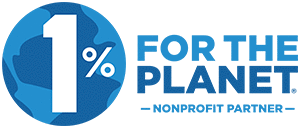 We at Global Ocean Health are thrilled to announce that we are now officially a nonprofit partner of 1% for the Planet. This laudable program represents a global network of businesses, individuals and nonprofit organizations tackling our planet’s most pressing environmental issues. Nonprofit partners are individually approved after a request from an existing network member.
We at Global Ocean Health are thrilled to announce that we are now officially a nonprofit partner of 1% for the Planet. This laudable program represents a global network of businesses, individuals and nonprofit organizations tackling our planet’s most pressing environmental issues. Nonprofit partners are individually approved after a request from an existing network member.
In this case we’d like to give a big thank you to AlkaViva and its CEO Jay Hare, who brought us into the 1% for the Planet fold and are generously donating to support Global Ocean Health.
 AlkaViva offers water filtration systems, ionizers, and tools to ensure healthy drinking water.
AlkaViva offers water filtration systems, ionizers, and tools to ensure healthy drinking water.
Here’s how 1% for the Planet works:
-
Join: Business members join the 1% network, committing to donate the equivalent of 1% of gross sales through a combination of monetary, in-kind and approved promotional support directly to environmental nonprofits.
-
Advise: 1% for the Planet provides partnership advising, pairing members with environmental nonprofits that align with their values, their brand and that make the biggest impact possible.
-
Donate: Business members support their nonprofit partner(s) directly—no intermediary necessary, forging meaningful relationships between partners.
-
Certify: 1% for the Planet certifies all member donations—legitimizing members’ commitment by reviewing and confirming sales and donation details annually.
It’s that easy—and also incredibly effective. To date, 1% program members have invested over $250 million in environmental nonprofit solutions through the 1% for the Planet network.
If you’re already a member of 1% for the Planet and would like to donate to our program — or are interested in becoming a member — let us know. We are also listed in their directory. You’ll be able to use their branding on your website and products, etc, as well as the assurance of knowing you’re working with pre-approved nonprofits that are doing work to improve the planet. You can choose multiple organizations to give to, or give exclusively.
Enormous Thanks to Everyone Who Came Out to “Keep the Feast Coming”
We are so grateful to all the wonderful guests, sponsors, volunteers, and generous donors who supported our May 10th benefit. An amazing turn out from people and businesses, on a beautiful spring day!
If you didn’t get a chance to donate on May 10th but would like to, please use this link to donate. There are other ways to contribute as well: Jordan Rabinowe of Pointe3 Real Estate and Proletariat Wine (who kindly contributed the wine for the benefit) will make a generous donation to Global Ocean Health when anyone conducts real estate through him and mentions us! You can also choose to have .05% of your Amazon purchases donated to our organization — at no cost to you — by choosing National Fisheries Conservation Center at this Amazon Smile link.
Thanks again for an amazing evening: we hope to see you next May!
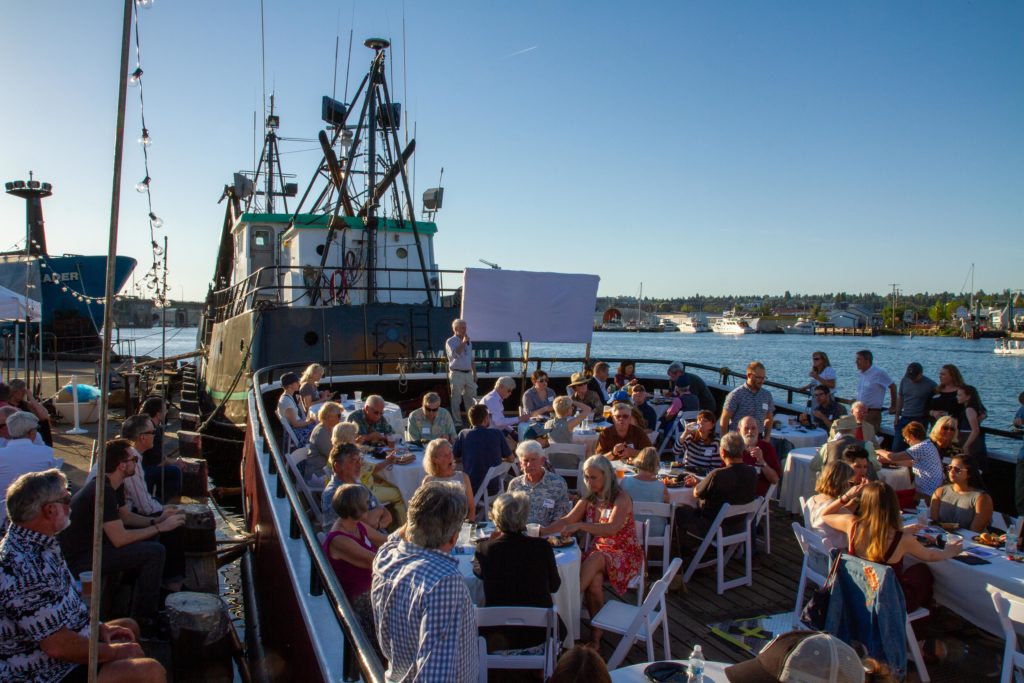
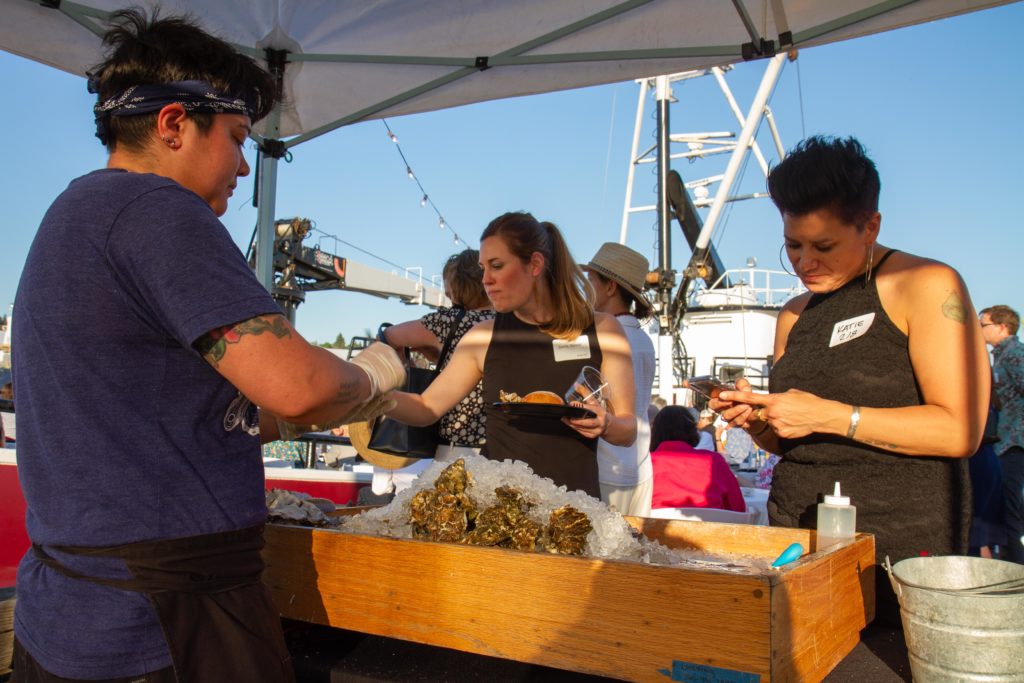
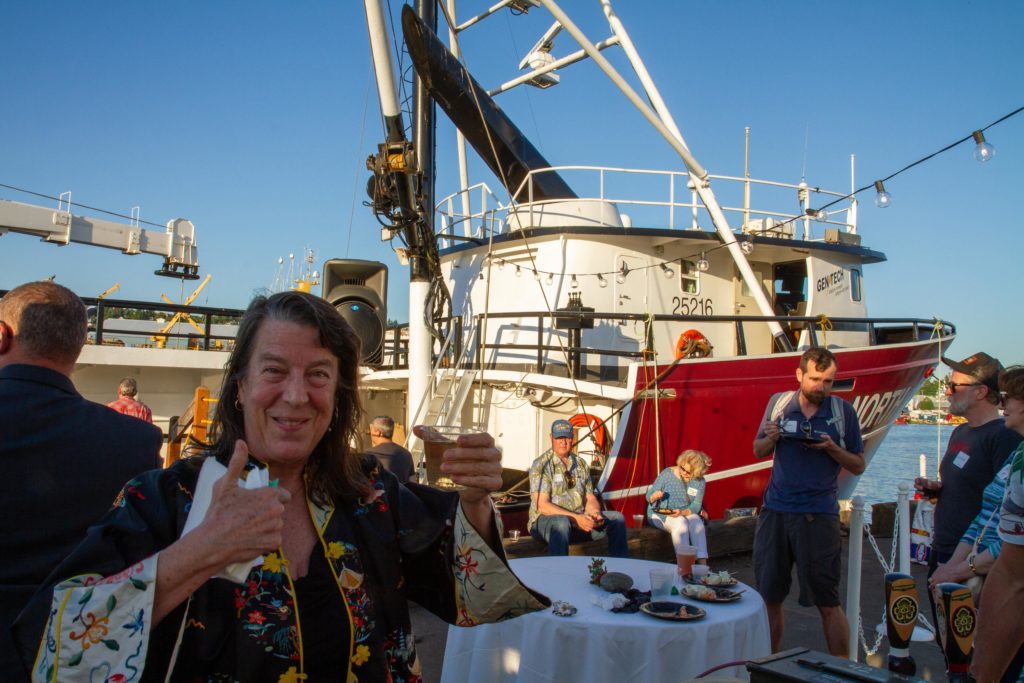
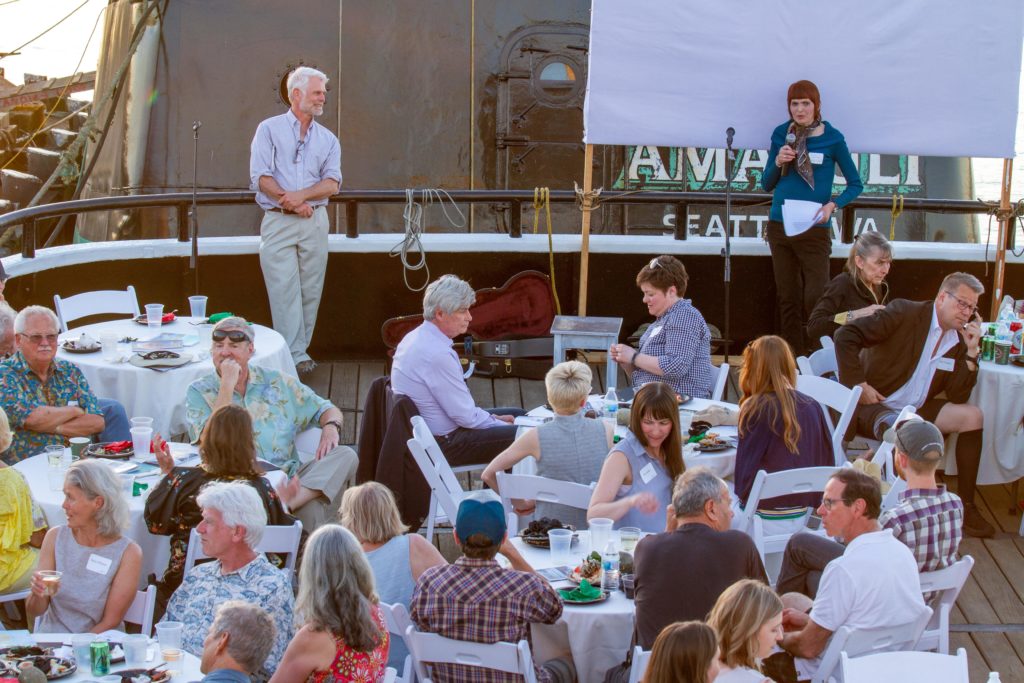
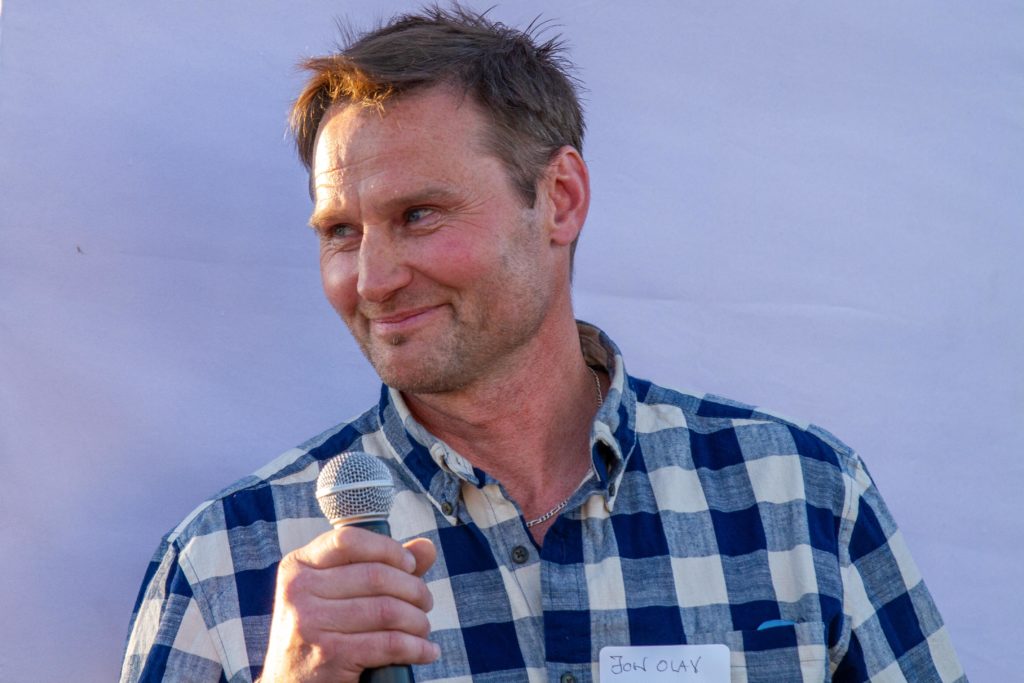
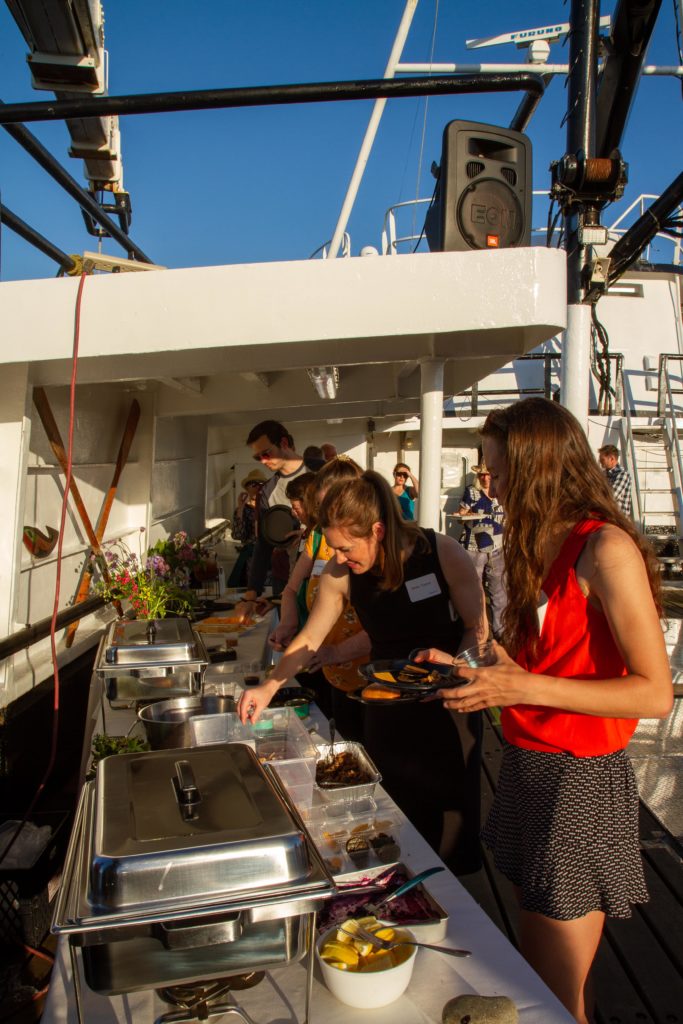
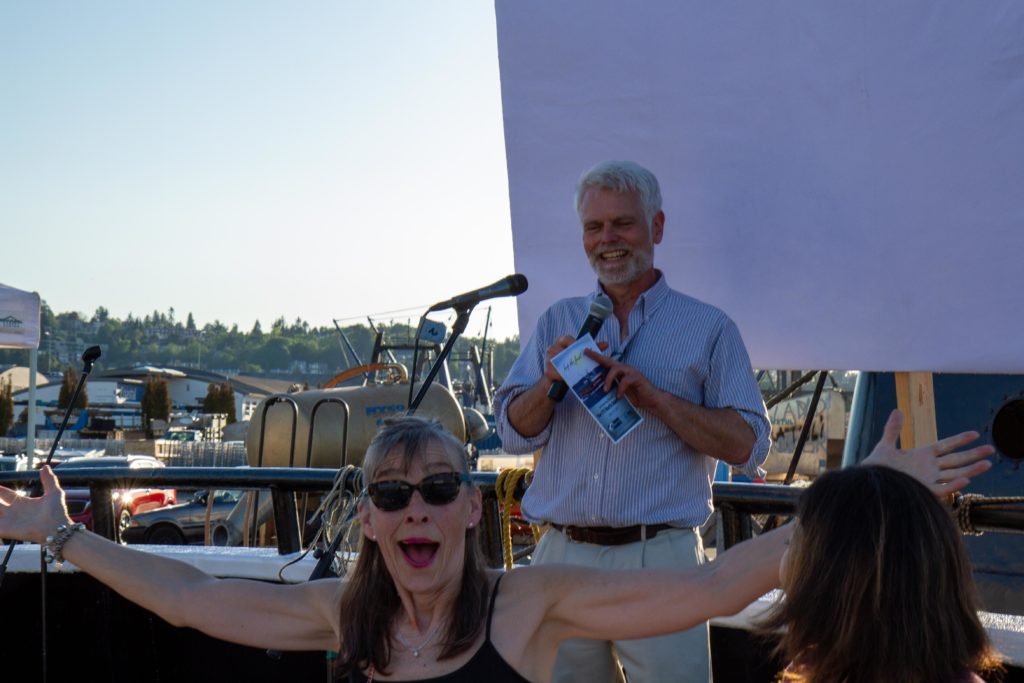
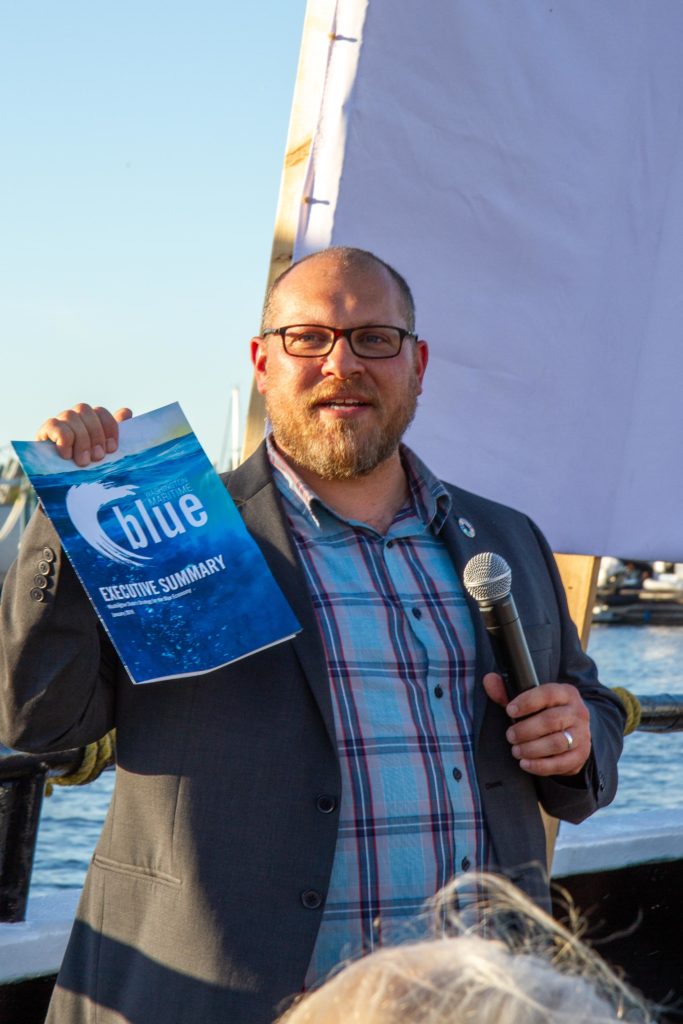
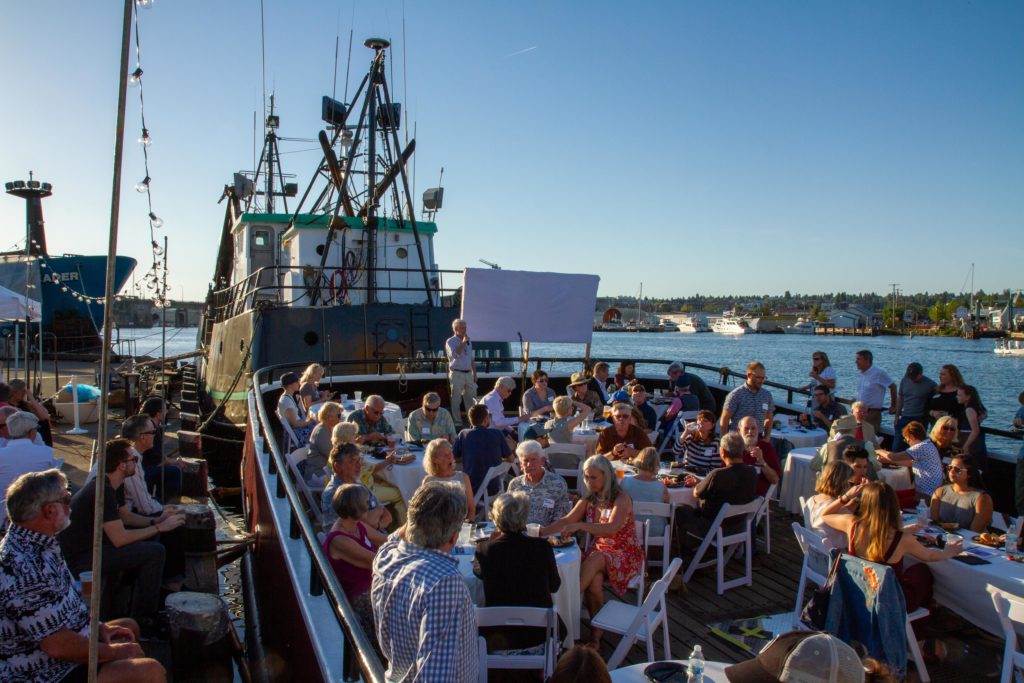
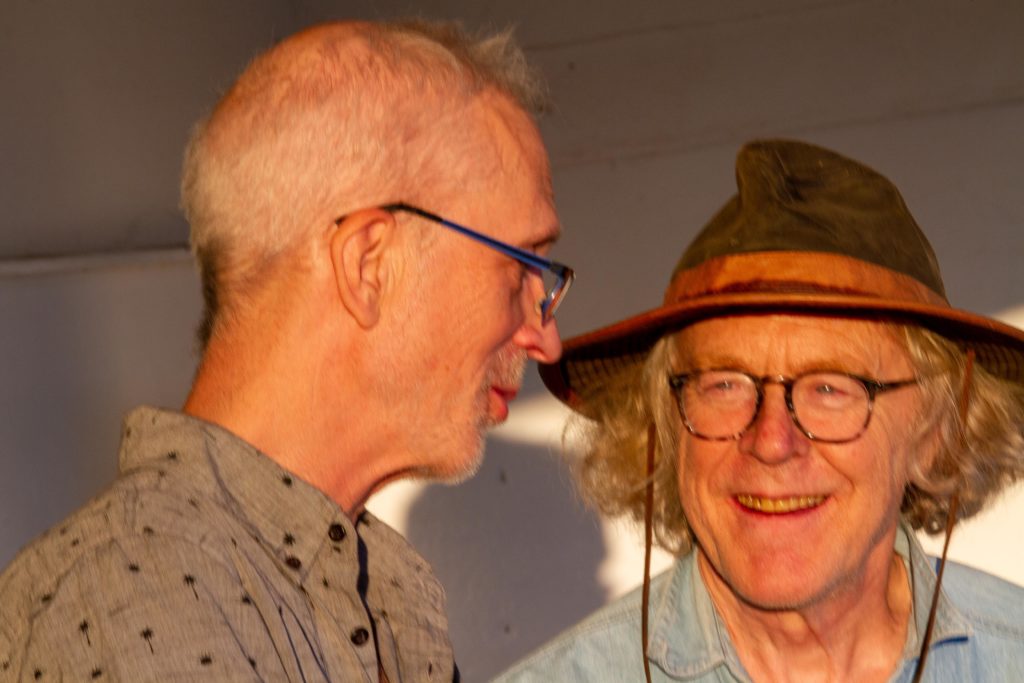
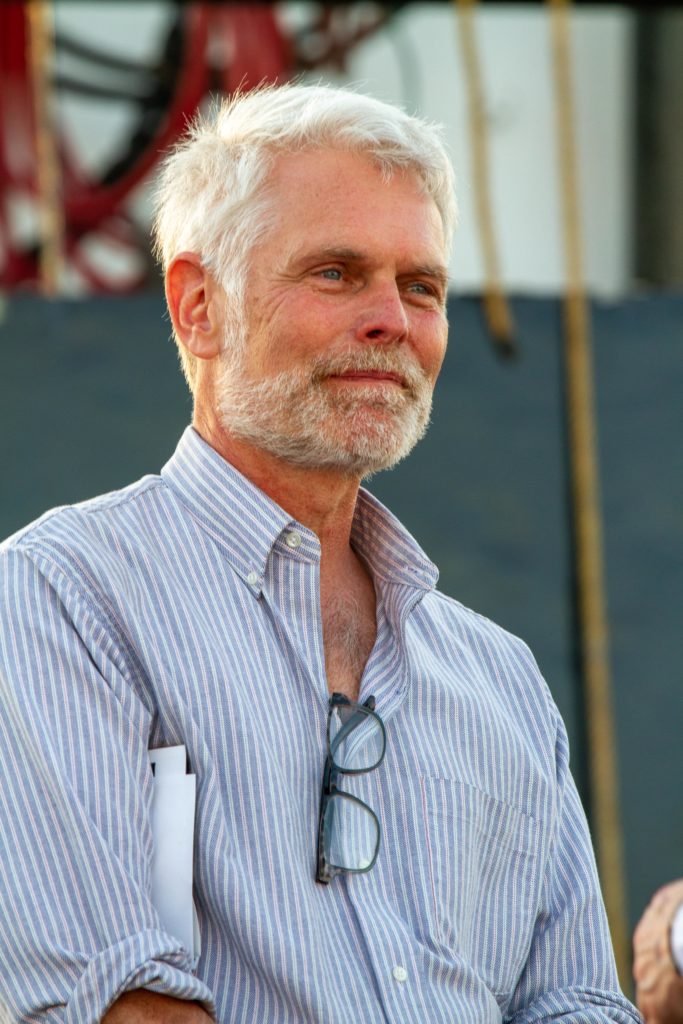
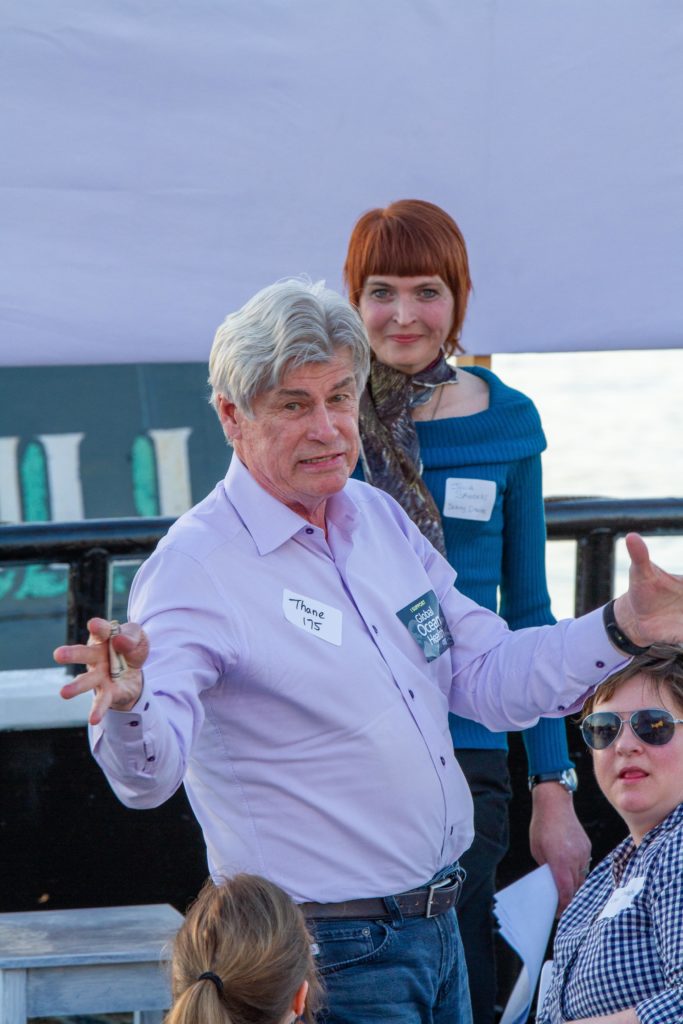
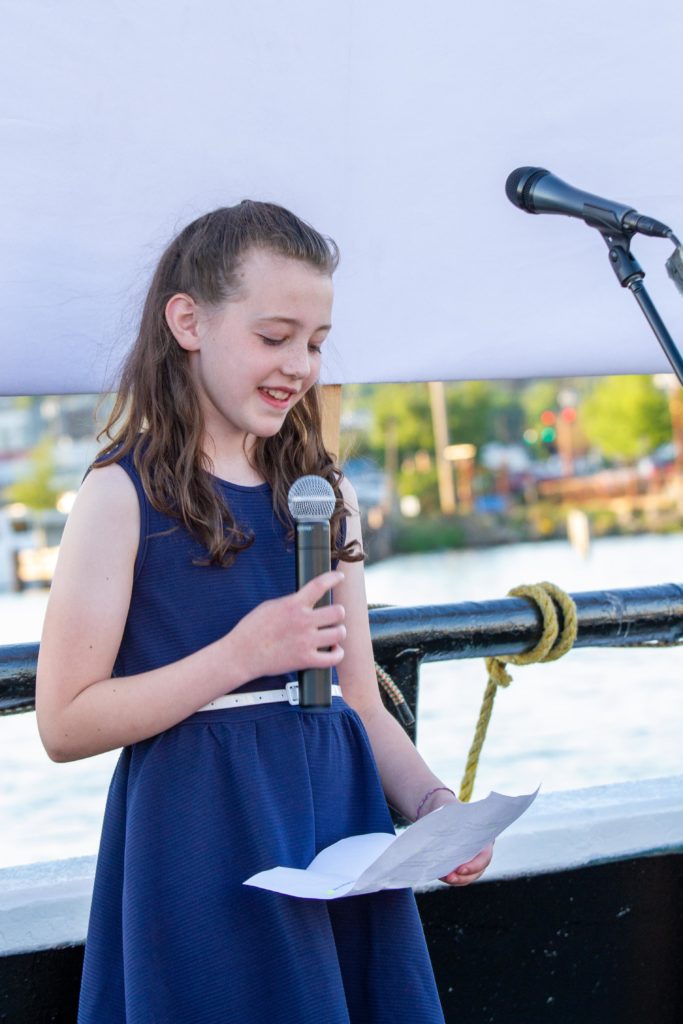
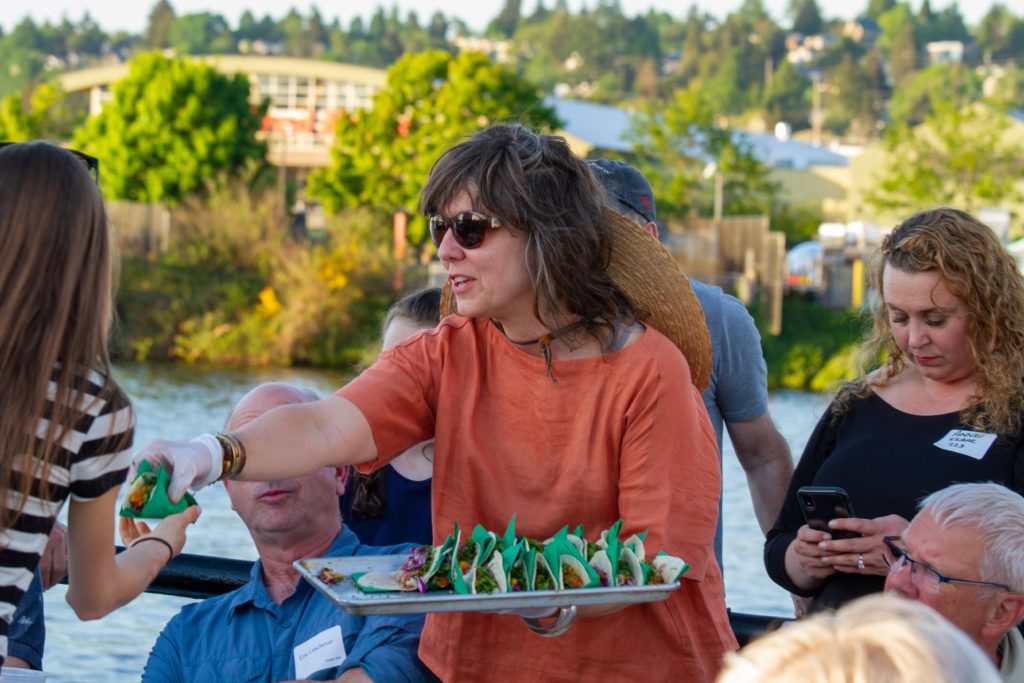
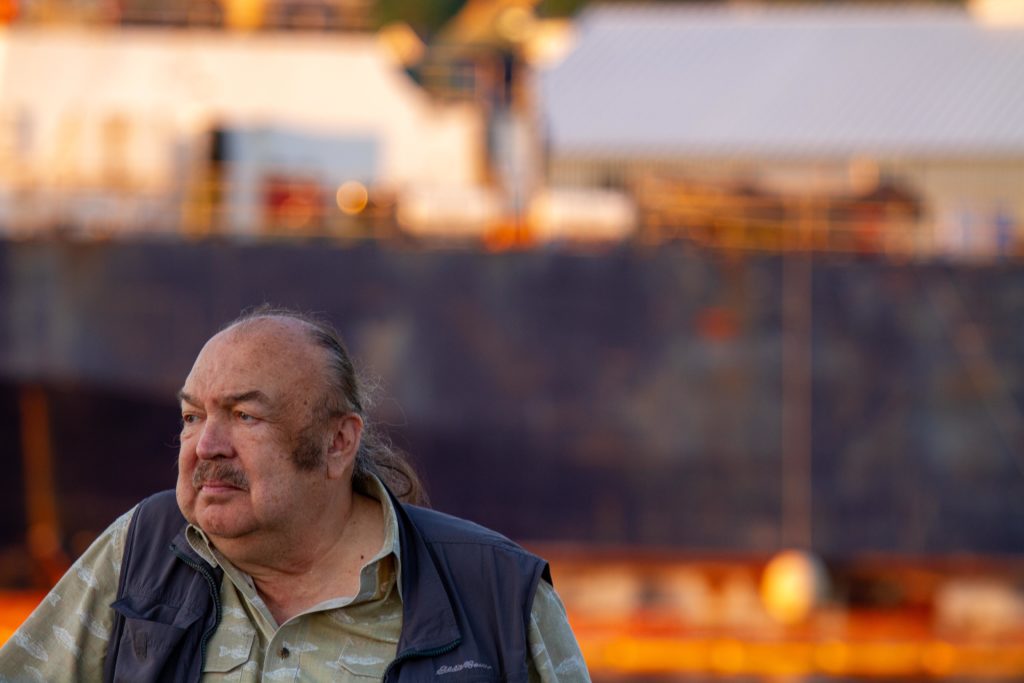
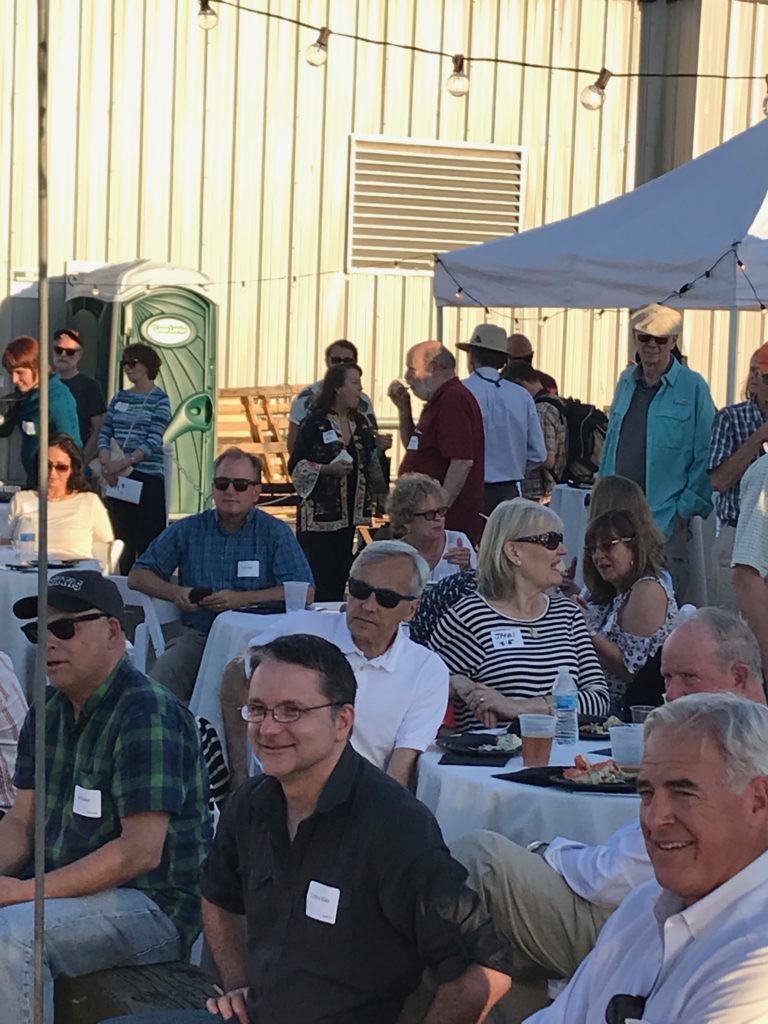
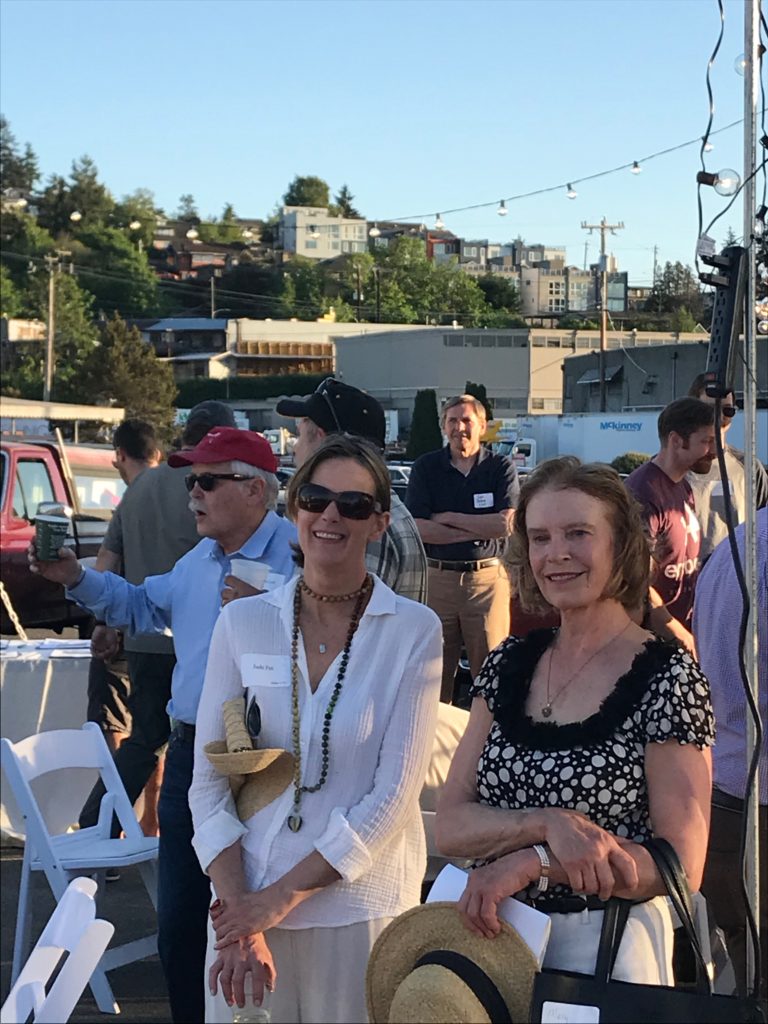
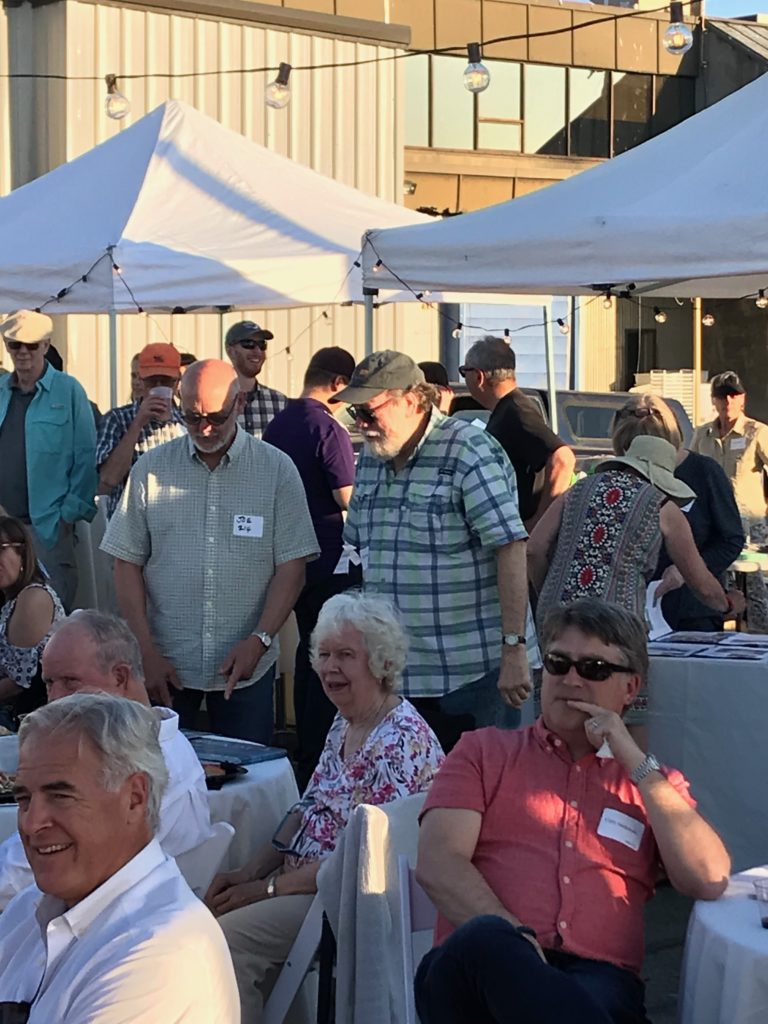
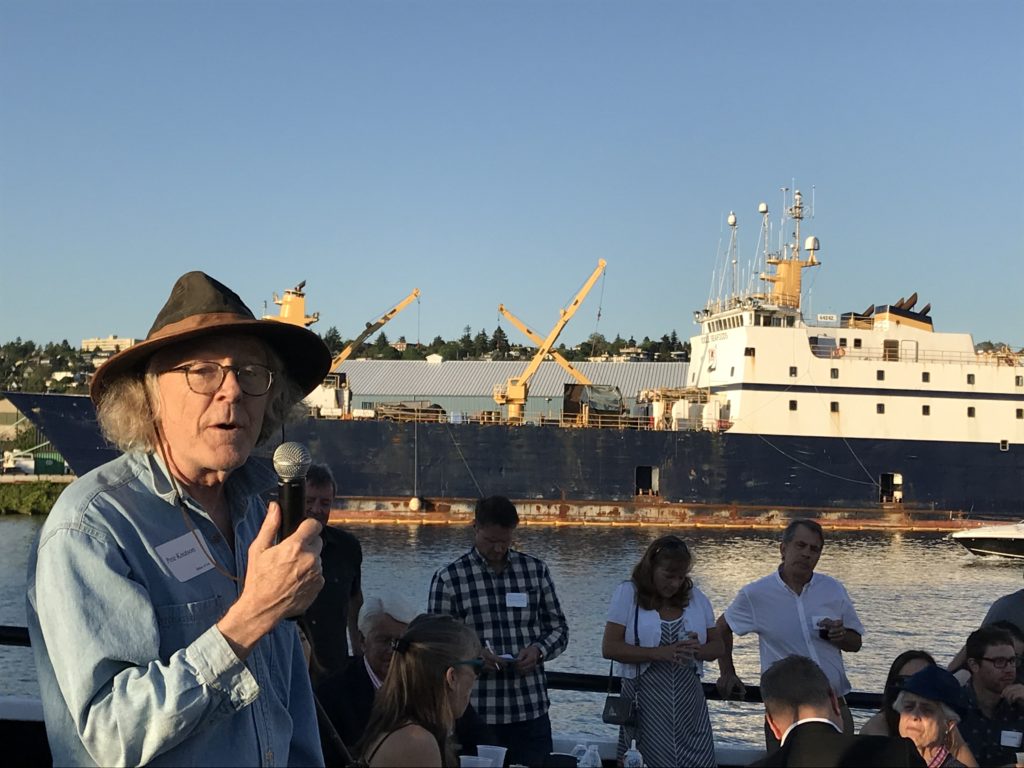
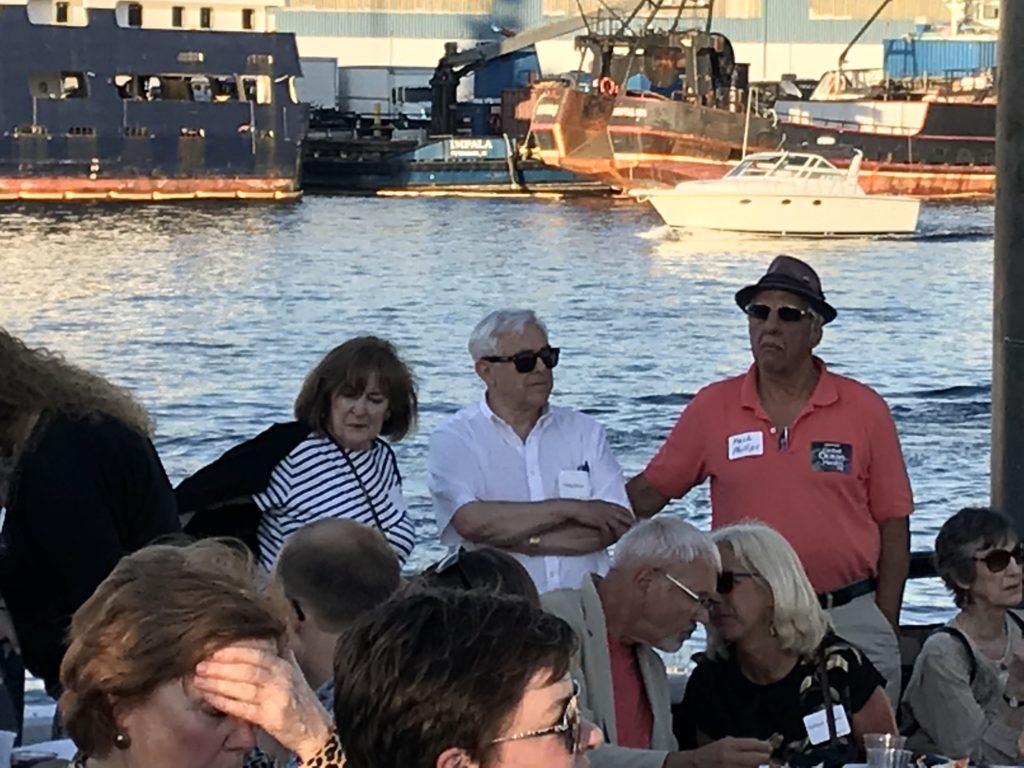
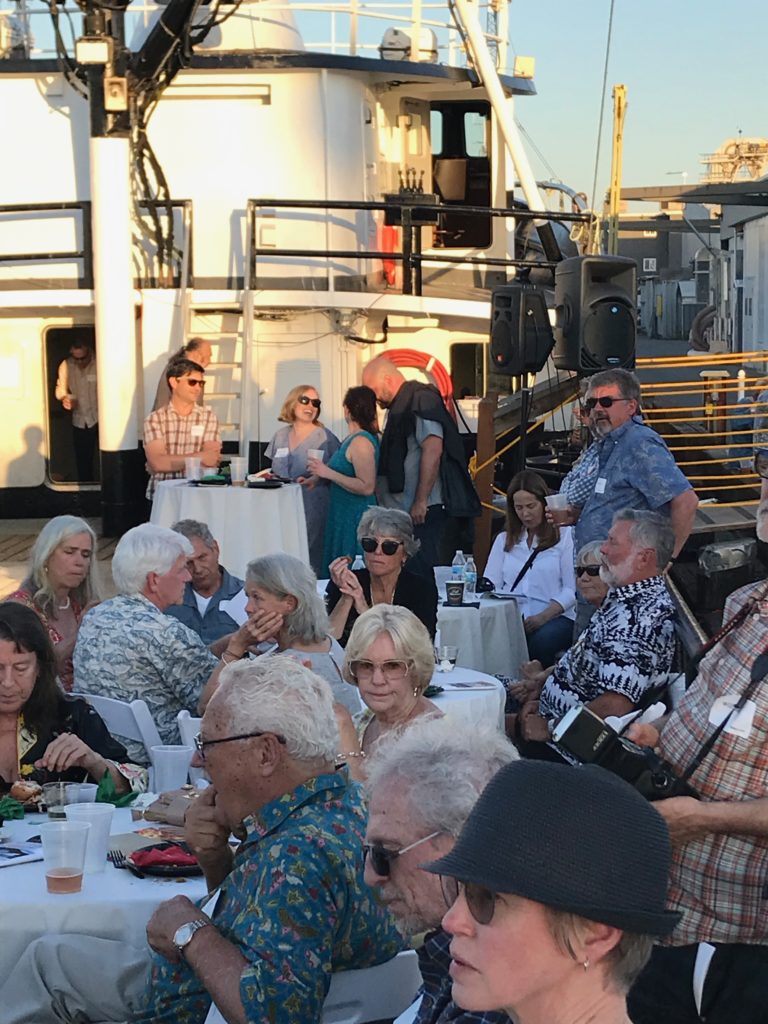
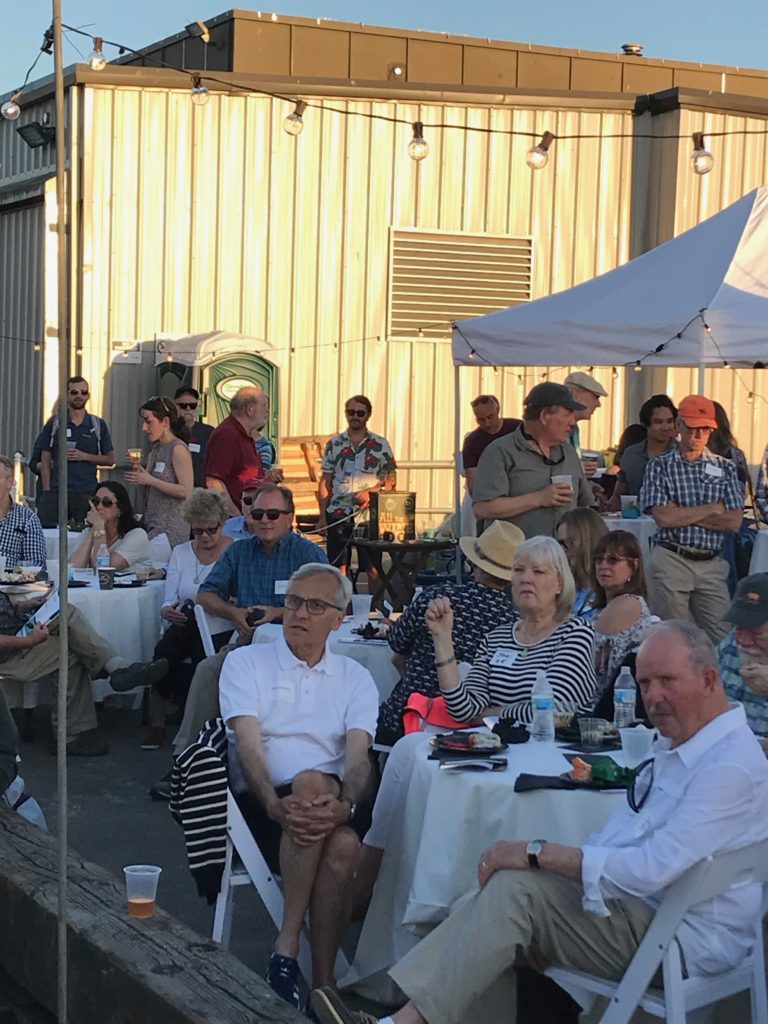
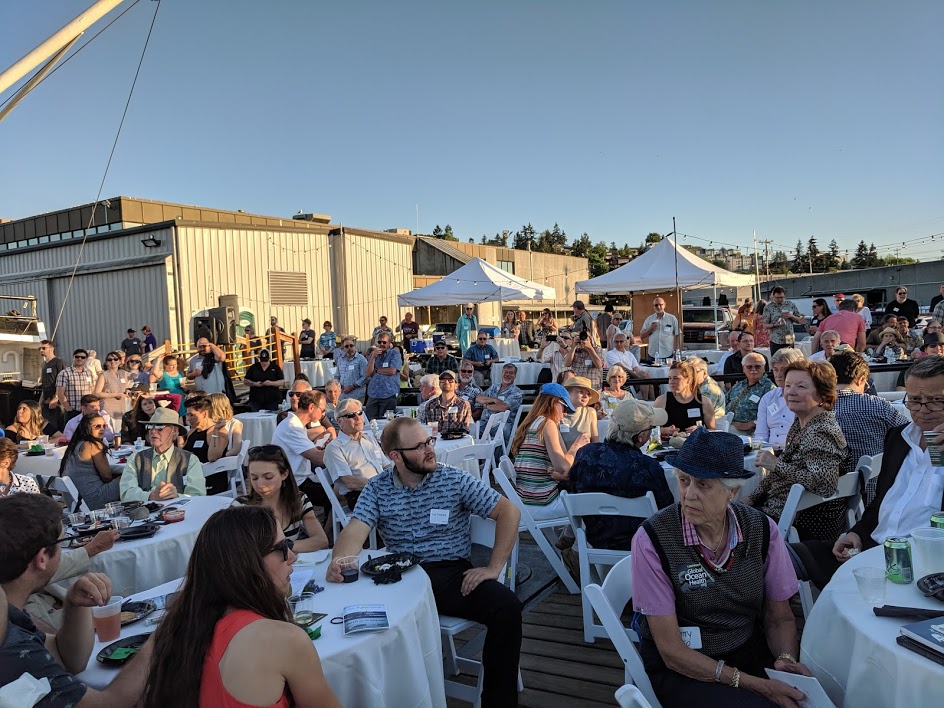
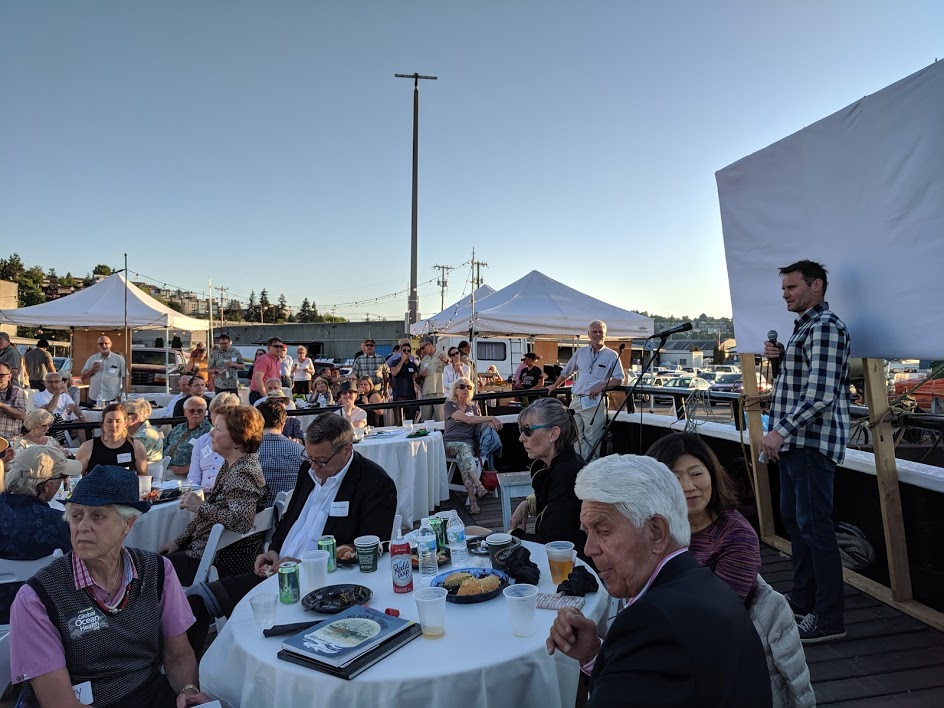
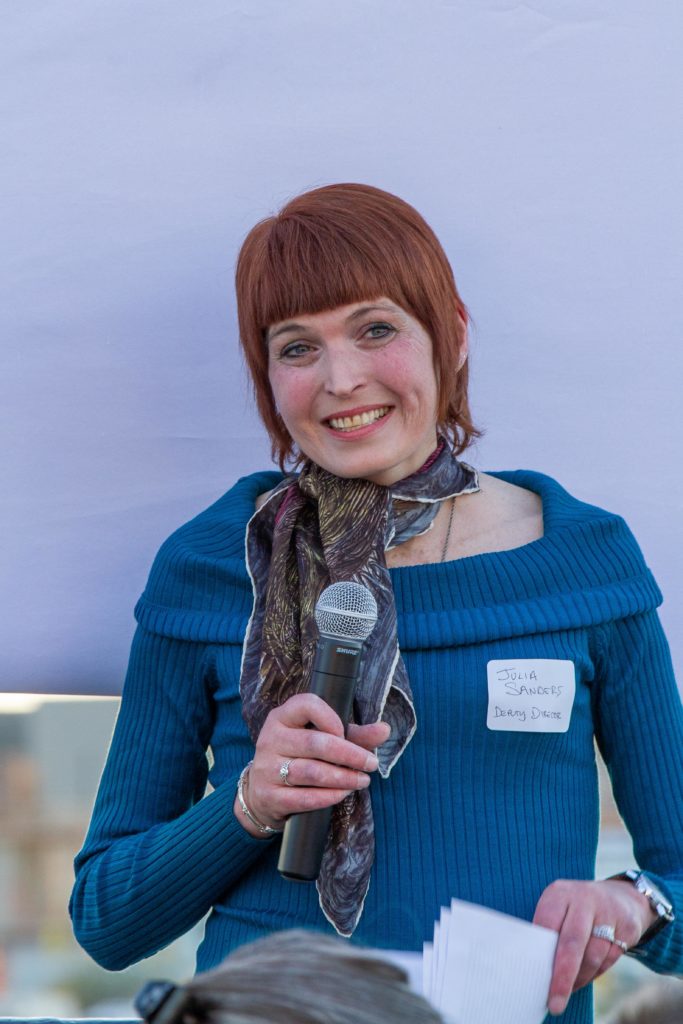
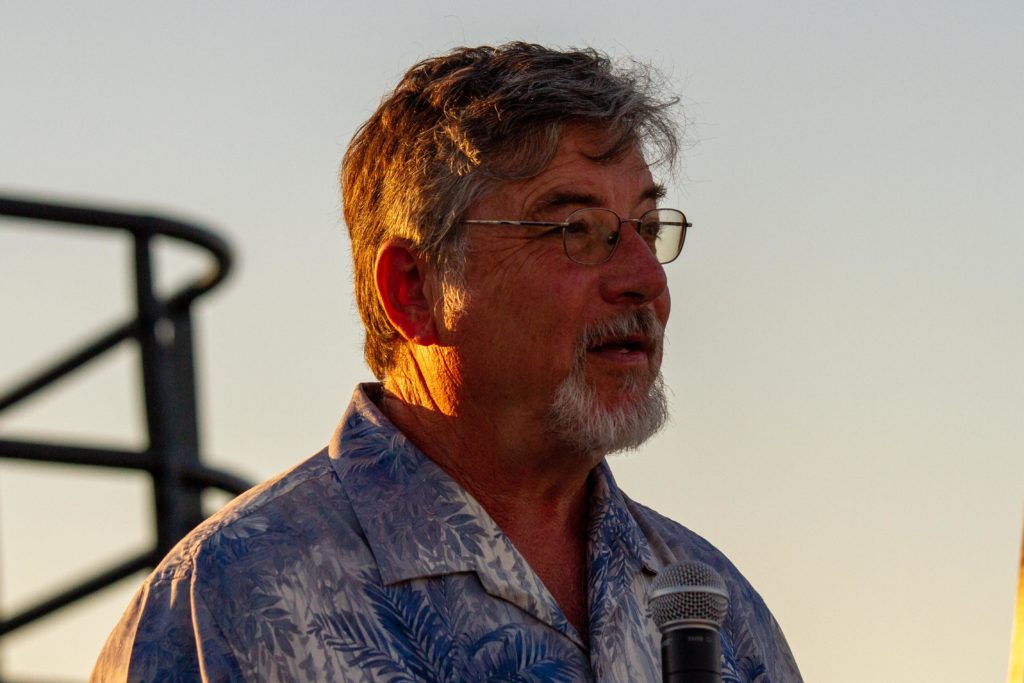
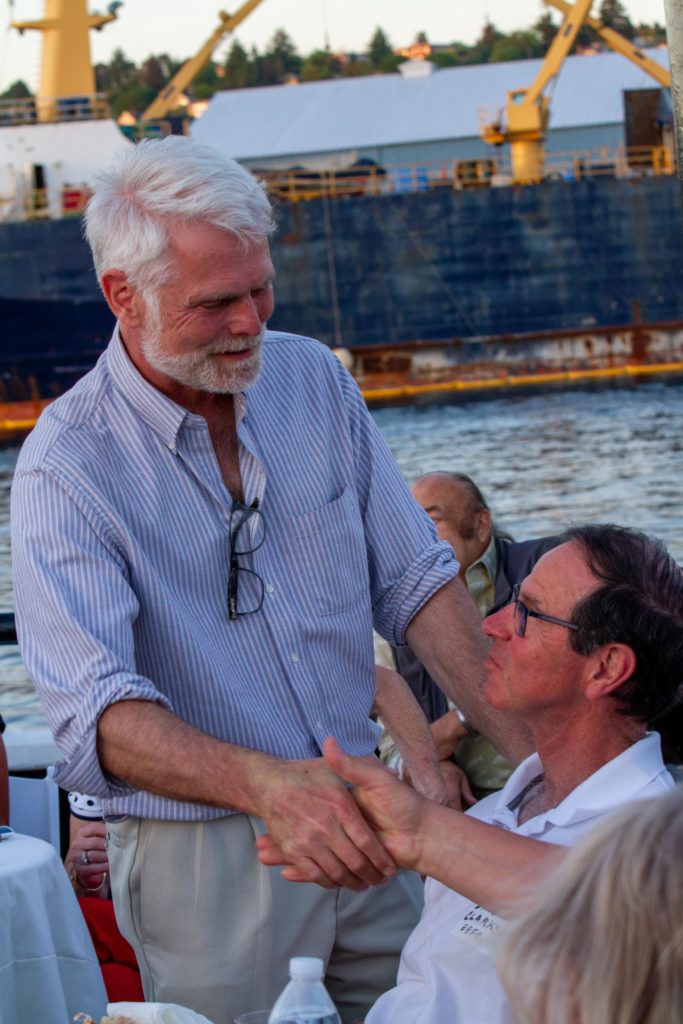
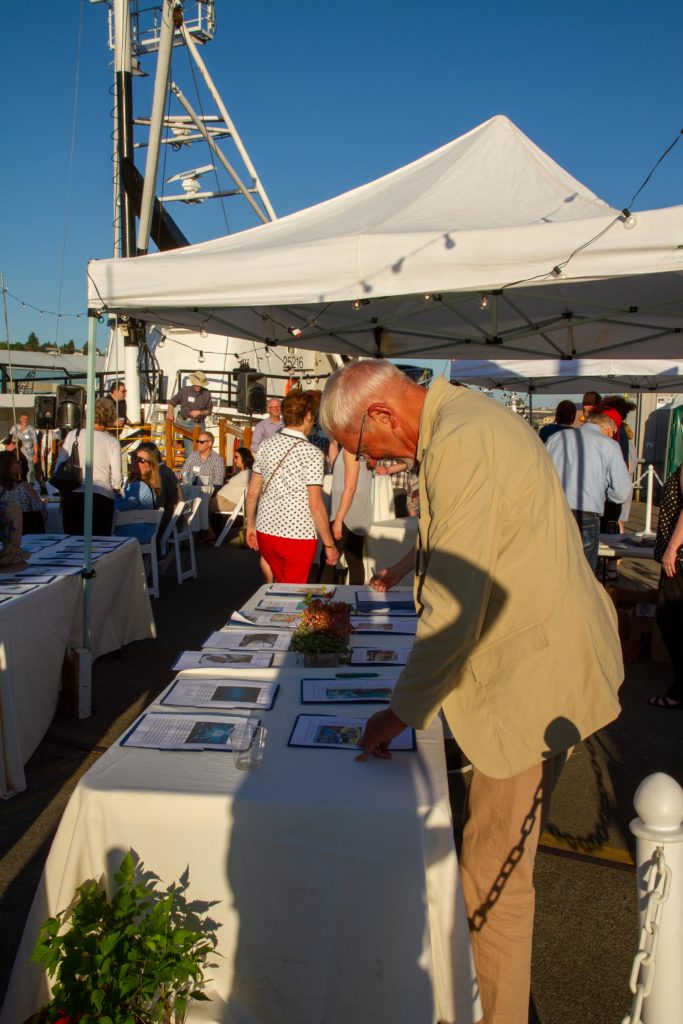
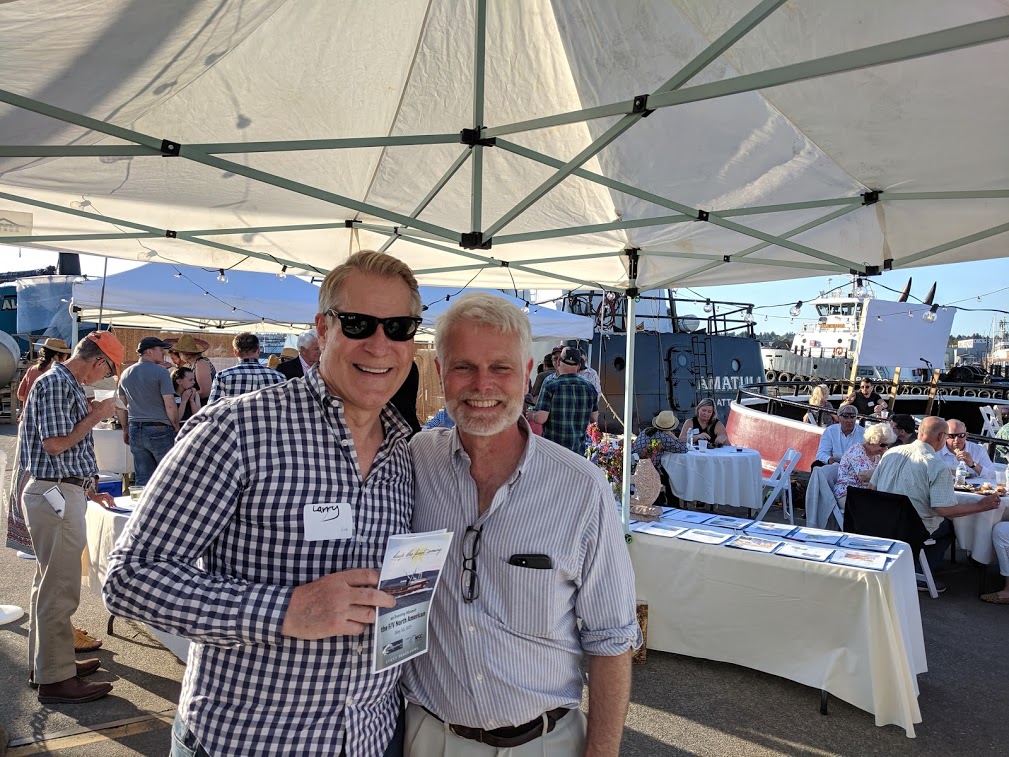
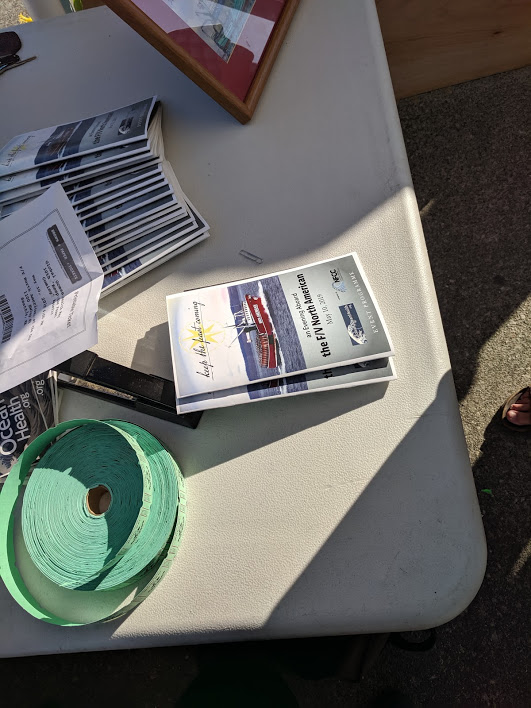
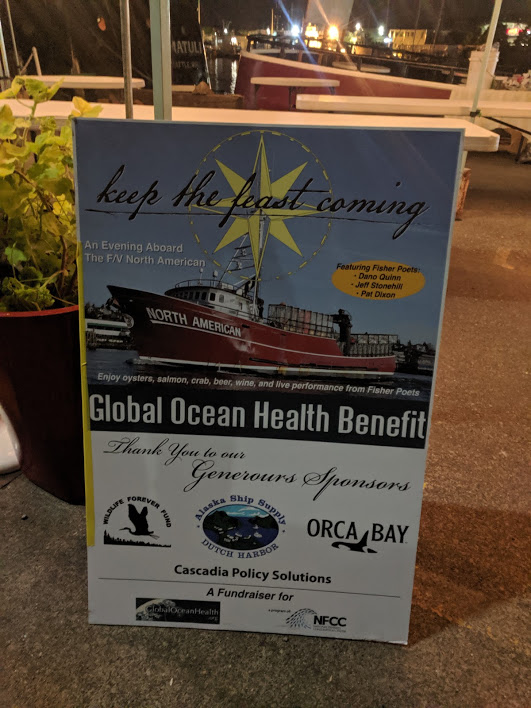
Global Ocean Health May 10th fundraiser – join us for oysters, salmon, crab and more aboard the F/V North American
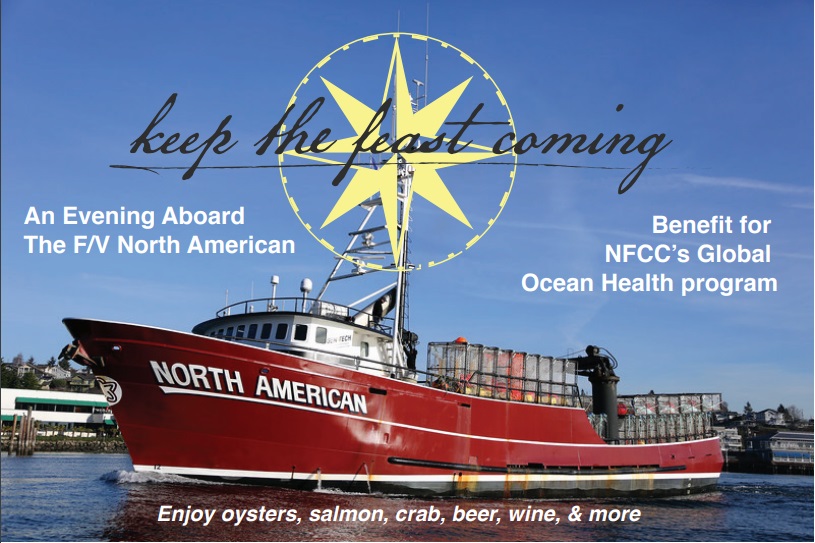
Join us aboard the F/V North American (as seen on “Deadliest Catch”) for an oyster bar, salmon, crab, beer, wine, and other delicious local foods. Check out the suite of emissions-reducing, fuel-saving technologies onboard and support National Fisheries Conservation Center’s Global Ocean Health program.
National Fisheries Conservation Center and its Global Ocean Health program have been part of the waterfront for decades: spreading the word and exploring how to tackle ocean acidification, harmful algal blooms, warming/species shift, and other changing conditions. This is your opportunity to show that work matters to you.
Hear from seafood leaders about the work of Global Ocean Health in ensuring that the ocean continues to produce the fish and shellfish we love, for our grandchildren and beyond. Enjoy entertainment from Fisher Poets and our own Executive Director Brad Warren! Participate in our silent auction and help the organization grow. We hope to see you there!
Buy your tickets at: https://globaloceanhealth.brownpapertickets.com
Opportunities for sponsorship or donation of food or products are available – reply for more information. If you can’t attend but would like to make a tax-deductible donation, visit: http://globaloceanhealth.org/donate/.
Thank you to our Gold Sponsors:
Alaska Ship Supply, Orca Bay Seafoods, and Wildlife Forever Fund
Thank you for your support — looking forward to seeing you May 10th! The F/V North American is docked at Ocean Beauty Seafoods, at 1100 W Ewing St, Seattle, WA – on the Ship Canal, close to the Ballard Bridge.
Brad Warren, Director
Julia Sanders, Deputy Director
Special thanks to all our generous in-kind donors: Taylor Shellfish, Grand Central Baking Company, Deckhand’s Daughter Seafood, Loki Fish Co, Proletariat Wines, Wild Salmon Seafood Center, Clearwater Resort and Casino, Seattle Sounders, Bakery Nouveau, MoPOP, Anne Kroeker and Richard Leeds, the Seattle Shakespeare Company, the Coca-Cola Company, Optimism Brewing Co, Agua Verde Cafe & Paddle Club, Finnriver Cider, Morning Glory Chai, Chinook’s, Vicki Sutherland-Horton, Holly Hughes, Ethan Stowell Restaurants, Cynthia Blair, The Old Alcohol Plant, Clipper Vacations, and of course Erling Skaar/GenTech.


Global Ocean Health May 11th fundraiser – join us for oysters, salmon, crab and more aboard the F/V North American

Join us aboard the F/V North American (as seen on “Deadliest Catch”) for an oyster bar, salmon, crab, beer, wine, and other delicious local foods. Check out the suite of emissions-reducing, fuel-saving technologies onboard and support National Fisheries Conservation Center’s Global Ocean Health program.
Learn how we’ve enabled local fishermen, seafood businesses, tribes, and coastal communities to modify a proposed carbon pollution law in Washington so it protects abundant waters and gives fishermen a fair deal. Initiative 1631, which will be on statewide ballots in November, would provide carbon revenues to reduce emissions and cope with unavoidable consequences of carbon pollution. It includes funding to enable owners of vessels and vehicles to invest in efficiency-improving technology on vessels and funding to help adapt to and remediate the effects of ocean acidification. Also included are funds to protect healthy forests, watersheds, and resource-dependent communities from climate impacts.
National Fisheries Conservation Center and its Global Ocean Health program have been part of the waterfront for decades: spreading the word and exploring how to tackle ocean acidification, harmful algal blooms, warming/species shift, and other changing conditions. This is your opportunity to show that work matters to you.
Hear from Bill Dewey of Taylor Shellfish and Pete Knutson of Loki Fish Co about the work of Global Ocean Health in ensuring that the ocean continues to produce the fish and shellfish we love, for our grandchildren and beyond. Participate in our silent auction and help the organization grow. We hope to see you there!
Buy your tickets at: https://globaloceanhealth.brownpapertickets.com
Opportunities for sponsorship or donation of food or products are available – reply for more information. If you can’t attend but would like to make a tax-deductible donation, visit: http://globaloceanhealth.org/donate/.
Thank you to our Gold Sponsors:
Thank you for your support — looking forward to seeing you May 11th!
Brad Warren, Director
Julia Sanders, Deputy Director
Special thanks to all our generous in-kind donors: Taylor Shellfish, Grand Central Bakery, Proletariat Wine, 192 Brewing Company, Baywater Shellfish Company, Olympia Oyster Company, Morning Glory Chai, The Central Co-op, Jensen’s Smokehouse, Anne Kroeker and Richard Leeds, Palisade, Chinook’s, Key City Fish, Vicki Sutherland-Horton, Chandler’s Crabhouse, Holly Hughes, Candere Cruising, Alki Kayak Tours, Seattle Theater Group, Jeffrey Kahrs, Tom Douglas Restaurants, Heronswood Gardens, Marche Restaurant, Cynthia Blair, The Old Alcohol Plant, Sleeping Lady Resort, Bellflower Chocolate, Finnriver Farm & Cidery, Clipper Vacations, Northwest Outdoor Center, Beacon Charters & RV Park, OceanLink, Claire Oravec, Caffe Appassionato, Vicki and Marc Horton and of course Erling Skaar/GenTech.


Washington’s Promising Pollution Story Starts With Oysters And Ends With Victory
ThinkProgress.com, by Natasha Geiling
Oct 28th, 2015
When Alan Barton first arrived at Whiskey Creek Shellfish Hatchery in 2007, he wasn’t expecting to stay very long. The hatchery — the second-largest in the United States — was in trouble, suffering from historically high mortality rates for their microscopic oyster larvae. But Barton knew that in the oyster industry, trouble is just another part of the job.
As manager of the oyster breeding program at Oregon State University, he had already helped one oyster larvae breeding operation navigate through some tough years in 2005, when a bacterial infection appeared to be causing problems for their seeds. To combat the issue, he had created a treatment system that could remove vibrio tubiashii, an infamous killer in the oyster industry, from the water.
Barton made the winding two-hour drive up the Oregon coast from Newport to Netarts, thinking his machines could easily solve whatever was plaguing Whiskey Creek. But when Barton’s $180,000 machine turned on, nothing changed. The hatchery was still suffering massive larvae mortality — months where nearly every one of the billions of tiny larvae housed in the hatchery’s vast network died before it could reach maturity.
Two-hundred miles up the coast in Shelton, Washington, Bill Dewey was also stumped. As director of public affairs for Taylor Shellfish, the country’s largest producer of farmed shellfish, he couldn’t figure out what was causing the hatchery’s tiny larvae to die in huge numbers. He knew aboutvibrio tubiashii, so when the die-offs began, Dewey called Barton and asked if they could install his machines at Taylor Shellfish’s own hatchery in the Puget Sound. And like at Whiskey Creek, the machines did little to stop the mysterious waves of death that were consuming the hatchery’s oyster larvae.
Back in Oregon, a National Oceanic and Atmospheric Administration (NOAA)-vessel rocked by persistent summer winds was approaching Newport. Dick Feely, a senior scientist with NOAA’s Pacific Marine Environmental Laboratory, was just halfway through the first-ever survey meant to measure the amount of carbon dioxide in the surface waters of the Pacific Coast. Already, he could tell from the few samples they had collected that he and his team had the material for a major scientific paper. He called his boss at NOAA to tell him that there was something wrong with the water. It seemed that an increase in carbon dioxide in the atmosphere, propelled by the burning of fossil fuels, was also increasing the acidity of the water.
Read more here
Shopping on Amazon will Donate to Global Ocean Health at no Cost to You
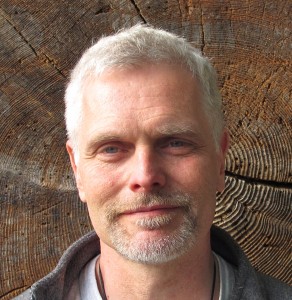 Please support us with your holiday shopping this season – it won’t cost you an extra penny, and every bit helps! Your support is HUGELY appreciated. Thank you in advance! All donations will go directly to the Global Ocean Health program. Simply click on the link below to choose National Fisheries Conservation Center as your charity of choice and %.5 of your purchase will be donated to Global Ocean Health (a joint initiative of National Fisheries Conservation Center and Sustainable Fisheries Partnership). Every little bit helps in our fight to keep stakeholders properly prepared to fight the effects of ocean acidification, and we greatly appreciate any help you can give.
Please support us with your holiday shopping this season – it won’t cost you an extra penny, and every bit helps! Your support is HUGELY appreciated. Thank you in advance! All donations will go directly to the Global Ocean Health program. Simply click on the link below to choose National Fisheries Conservation Center as your charity of choice and %.5 of your purchase will be donated to Global Ocean Health (a joint initiative of National Fisheries Conservation Center and Sustainable Fisheries Partnership). Every little bit helps in our fight to keep stakeholders properly prepared to fight the effects of ocean acidification, and we greatly appreciate any help you can give.
http://smile.amazon.com/ch/91-1686596
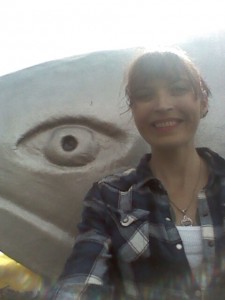 And if you feel inspired to give a little more, please choose the paypal donation button on the right of this page, to donate any amount from $2 and up! It’s fully tax-deductible. We here at GOH pour our hearts into this program, and donate much of our time. We have been crucial leaders in the fight to save the the west coast oyster industry and reach out to coastal and fishery stakeholders, giving them a voice in the struggle (just check out our accomplishments section for a few stories of many). It would mean the world to us if you could find it in your heart to make a small donation toward our cause.
And if you feel inspired to give a little more, please choose the paypal donation button on the right of this page, to donate any amount from $2 and up! It’s fully tax-deductible. We here at GOH pour our hearts into this program, and donate much of our time. We have been crucial leaders in the fight to save the the west coast oyster industry and reach out to coastal and fishery stakeholders, giving them a voice in the struggle (just check out our accomplishments section for a few stories of many). It would mean the world to us if you could find it in your heart to make a small donation toward our cause.
We wish you a joyous and peaceful holiday season, and look forward to continuing the fight to protect our productive ocean and abundant fisheries in 2015, with your support. GOH is Protecting Seafood at the Source, reaching across party lines to bring meaningful change to stakeholder protections and ensure ocean acidification research receives the support it needs to prepare us for the future. Thanks to all of you who have supported us on the way, and all of you that will support us in the future. We have big plans ahead.
Warmest Regards,
Brad Warren, Julia Sanders, & the rest of the team

